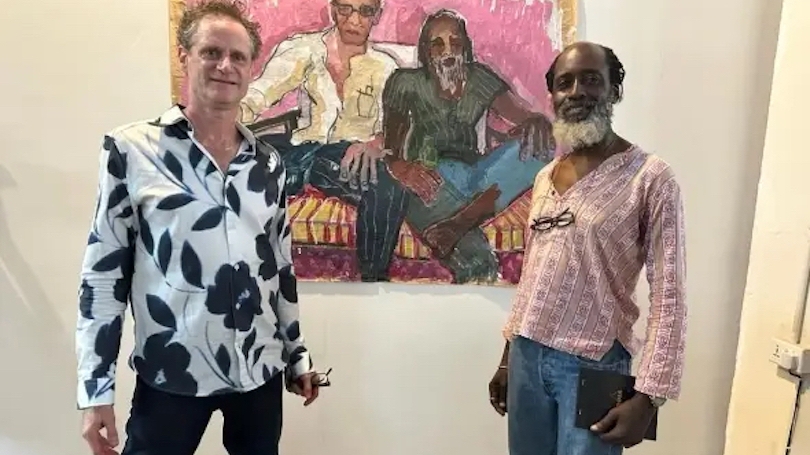
- About
- Departments & Programs
- Faculty Resources
- Governance
- Diversity
- News
Back to Top Nav
Back to Top Nav
Back to Top Nav
Back to Top Nav
The major exhibition by the African and African American studies and anthropology professor recently opened at Nuku Studio in Tamale, Ghana.
Routes of Rebellion, a major solo exhibition by Jesse Weaver Shipley, recently opened at Nuku Studio in Tamale, Ghana.
The show explores the aesthetics of Ghana's Cold War and anti-imperial cultural and political movements from the 1970s through 2000s, tracing the paths that radical artists, athletes, and thinkers travel in challenging power. It features 12 installation films, a photographic cycle of 80 images, and a two-channel video installation at nearby Red Clay studio—showcasing real and fictional people who push back against established norms.
"Rebels are often people who move between two worlds, culture-brokers constantly in motion, looking and listening from various angles simultaneously," says Shipley, the John D. Willard Professor of African and African American Studies and Oratory in the Department of African and African American Studies. "But insurgent creativity comes at a cost. As people imagine new ways of living, they struggle to be understood."
The works were produced over the course of Shipley's 20 years of research-based practice moving between Ghana, New York, and London, where he forged long-term collaborations with fellow artists and cultural theorists.
"Shipley is a storyteller for our times," says Nuku Studio Director Nii Obodai. "He is not above the story but inside it and speaks from experience. He builds his work through deep relationships with people and places, and in the process, his subjects become co-creators of the narratives. Part of Shipley's work and 'privilege' as an outsider to Ghana is that he accesses a breadth of stories that many of us cannot easily retrieve. He brings out our history, our politics, and our arts in ways that few of us have been able to tap into."
An artist, filmmaker, writer, and ethnographer, Shipley has exhibited his art across Europe, North America, and Africa. He is the author of numerous articles and books, including Living the Hiplife: Celebrity and Entrepreneurship in Ghanaian Popular Music and Trickster Theatre: The Poetics of Freedom in Urban Africa. He is currently completing two books: Ghana's Lost Revolution: Black Sovereignty and the Global Cold War Order in Ghana 1979-1983 and Aesthetics of Revolution: Political Performance and the Shape of Power.
Dartmouth Screenings and Conversations
On Jan. 16 and 17, Shipley will take part in public conversations about the exhibit in conjunction with Professor of Anthropology Laura Ogden's Ethnographic Film course. He will be joined virtually by Tamale-based filmmaker Timtooni Junaid Yakubu '16, who collaborated with Shipley on a documentary about the exhibition:
From Documentary to Experimental Film: Aesthetic Choices
Tuesday, Jan. 16, 4:30–6:20
Black Family Visual Arts Center Room 110
Collaboration and Process
Wednesday, Jan. 17, 3:30–5:20
Black Family Visual Arts Center Room 110